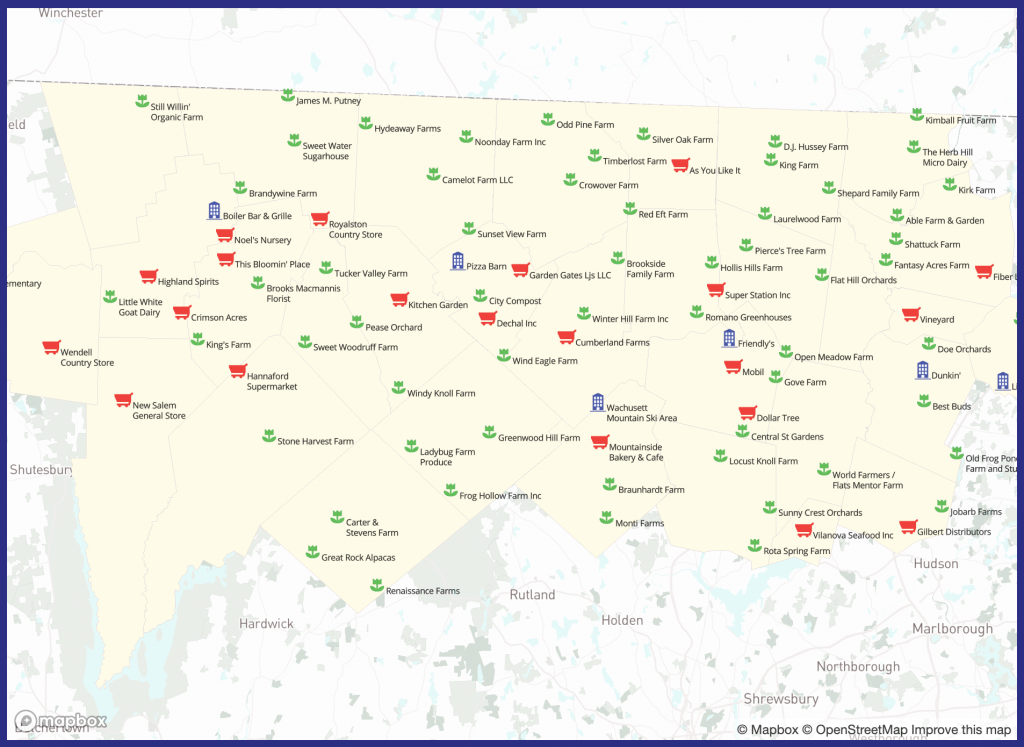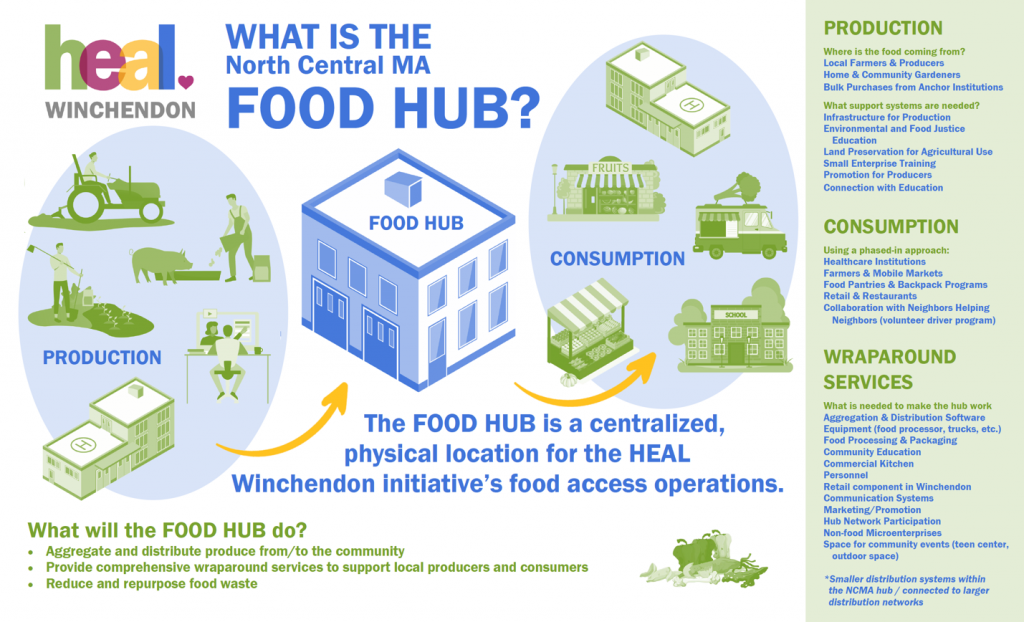DUSP-PKG Fellowships: Allison Hannah Lee, Part I
Allison Hannah Lee is a Master in City Planning candidate at MIT, focused on design and development. During summer 2021 she is partnering with the Community Foundation of North Central Massachusetts and local organization Growing Places to plan and implement a regional food hub that provides a better quality of life, of health, and of jobs in north central MA.
In early January 2017, the Winchendon IGA grocery store permanently shut its doors. Without explanation or forewarning, employees and shoppers alike were puzzled at the sudden closure of the supermarket, located in the modest downtown core of Winchendon, MA. But it was only in the following weeks that the concern really set in amongst the residents of the small town, who found themselves without convenient access to a comparable grocer. Slowly, the residents adapted to the loss, turning to one of few remaining options: driving 25 minutes to a New Hampshire Walmart, purchasing shelf-stable groceries from the mini-mart, or joining the local food pantry. For those with low-income, who are elderly, or without a car, the choice was even more limited.
This was a new problem for Winchendon residents, but it was not new to the region. For decades, towns across MA had been epicenters of production, not only of agriculture but of toys, furniture and textiles. These mill towns thrived in the early industrial years, but faced stark decline with decreasing production and increasing overseas trade. As populations shrunk, so did the tax base, the available jobs, and the resources for community amenities. Local businesses continued to be replaced by chain stores. One resident remarked, “You can drive around the region and the towns all look the same.” Towns, desperate to attract businesses, commonly dole out tax incentives to businesses willing to site within their borders. Often, these entities are major national chains such as Cumberland Farms or Family Dollar.

As rural towns across the state struggle to retain local small businesses and an adequate tax base, they also are challenged with declining public health rates. In many cases, these health concerns can be linked to healthy eating and living, to mental health, and to environmental issues. A 2017 Community Food Assessment study, conducted by The Community Health Network Area of North Central Massachusetts (CHNA 9), surveyed 1054 residents from MA towns to better inform issues related to food security, food access, and food quality within the region. A stratified random sampling (n=383) from the towns of Clinton, Fitchburg, Gardner, Leominster, and Winchendon represented the town’s proportional population size in the region. Based on the sample study, they concluded that 33% of North Central MA residents were food insecure – a rate 3x higher than the overall state food insecurity – and that 15% of the surveyed individuals identified purchasing food mainly at dollar stores or convenience stores, with the others identifying main food sources as food pantries (8%), warehouse stores (7%) supermarkets (53%) and superstores (12%). A notable 69% of the individuals reported having less than the five recommended daily servings of fruit and vegetables, identifying cost, preference, and schedule as the major barriers.[1]
Why does this matter?
Across the U.S., and exacerbated by COVID-19, food insecurity is on the rise. Defined by the USDA as “reduced quality, variety or desirability of diet” and/or “indications of disrupted eating patterns and reduced food intake”,[2] food insecurity is distinctly linked to communities, to economic and market forces, and to the built environment. Whereas the term “food desert” has been applied to areas that lack access to food, the variation title “food swamp” has been recently used for areas that lack access to healthy or quality foods, often only providing cheap ultra-processed food instead. Public health experts are seeing alarming overlaps between areas of “food swamp” conditions and rates of nutrition-related chronic diseases, as reported by the MA Food is Medicine state plan initiative.
Spurred by what was happening around them, a consortium of local actors came together to form the North Central MA Food System Partnership to rethink their own regional food economy. Members include residents, farmers, local organizations, hospital groups, and planning bureaus, and over the past two years they have been building momentum to tackle this complex issue with solutions that address not only food access, but economic depression, quality of agricultural jobs, lack of amenities, social isolation, and education. By placing self-determination at the forefront of their objectives, the Partnership is determined to create a holistic system that considers each player along the food value chain, from the producers to the packers to the processors to the retailers to the consumers.
Initial Perceptions and Questions
Any place-based problem needs a strong local voice to advocate for change. But it takes more than one voice if the solution is to be economically- and socially-sustainable. For this, a movement is needed. A community food security movement spans a range of fields, including public health, ecological system analysis, and community development. Basic principles include:
- Inclusivity in who participates, with objectives linked to community revitalization;
- Empowerment for individuals to be self-reliant;
- Community resources and systems to support self-reliance;
- Local agriculture and increased consumer knowledge; and
- An interdisciplinary and collaborative approach to understanding and improving the community’s food system.

The Partnership, convened by organizations such as Growing Places and Central Mass Grown and supported by funding bodies like The Community Foundation of North Central MA, is the heart of this community food security movement. Contributing sources of energy and insight are the farmers, the urban planners, the volunteers, the anchor institutions, and the external grants from USDA and COVID-19 relief aid. The contributors, like the project itself, juggle many tasks at once. People work multiple jobs, often donating their evening or free time to the project. Agreement on issues is not a guarantee, and trust has to be earned. The process is less a linear pathway from plan to completion, and more a slow and deliberate chipping away at a new system taking form within a living community. It is difficult and it is nuanced, but it is necessary.
The complexities of the project meld economic, social, cultural, and operational issues. The Winchendon IGA was deemed economically unprofitable by its parent company, thus it closed. Local farmers cannot compete with prices in the region, thus they take their product to metro cities like Boston. Low-income residents in north central MA prioritize grocery shopping at Dollar Tree and CVS due to perceived and actual savings, thus further sending local income out of the region. Federal subsidies provide short-term food assistance, but do not provide agricultural job stability. Agriculture is not viewed as an economic driver.

As this particular project progresses and I understand more about the specific activities that contribute, in the long- and short-term, to the current state of food insecurity and system imbalance, I have found myself reflecting on the wider population, asking, “is this activity being replicated in rural pockets across the entire nation?”. If so, what are the circumstances within these communities that lay the foundation for this occurrence? What conditions exacerbate the problem? And after the supermarkets close, what happens to the community?
Sectors and localities around the nation are reimagining place-based sustainable food economies in the form of design proposals, economic recovery plans, and entrepreneurial opportunities. As we engage with the task of reimagining, I argue we must first investigate more thoroughly the inputs that devolved our food system to its current state. Then we might proceed with careful redesigns of a healthy food economy on which so much relies.
Allison Hannah Lee is DUSP-PKG Fellow jointly supported by the Department of Urban Studies and Planning and the PKG Center. Interested in applying to this type of fellowship? Click here to learn more!
[1] Benes, Deborah, PhD, RN (2019) North Central MA Community Food Assessment Survey Results CHNA9 Healthy Eating Active Living CHIP.
[2] UDSA Economic Research Service. Food Nutrition Assistance (2021).
Tags: Agriculture & Food, DUSP Fellowships, DUSP Fellowships 2021, Health, PKG Fellowships, PKG Fellowships 2021
